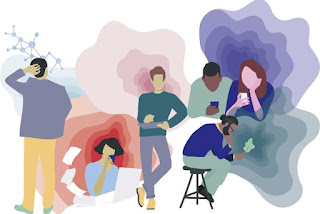Coping with Trauma: Strategies for Healing and Recovery
Trauma can have a lasting impact on an individual's mental
and emotional wellbeing. It can lead to feelings of anxiety, depression, and
even post-traumatic stress disorder (PTSD). Coping with trauma can be
challenging, but there are strategies that can help individuals heal and
recover. In this blog post, we'll discuss some of the most effective coping
strategies for trauma.
Seek Professional Help
The first and most important step in coping with trauma is to
seek professional help from a mental health counselor
in Bhopal.
Trauma can be overwhelming and can affect an individual's ability to function
in daily life. A mental health professional can help individuals process their
trauma and develop coping skills. Therapy, counseling, and medication can be effective
treatments for trauma.
Practice Self-Care
Trauma can take a toll on an individual's physical and
emotional health. Practicing self-care can help individuals manage their
symptoms and promote healing. This can include activities such as exercise,
meditation, journaling, spending time with loved ones, and getting enough
sleep.
Connect with Supportive
People
Having a support system is crucial when coping with trauma.
Connecting with supportive friends and family members can help individuals feel
less isolated and provide emotional support. Support groups, online forums, and
counseling groups can also be helpful resources for individuals coping with
trauma.
Develop Coping Skills
Developing coping skills can help individuals manage their
symptoms and reduce the impact of trauma on their daily life. Coping skills can
include mindfulness, breathing exercises, relaxation techniques, and grounding
techniques. These techniques can help individuals manage their symptoms and
reduce the impact of trauma on their daily life.
Also Read: Drug Addiction Treatment in Bhopal
Engage in Creative
Activities
Engaging in creative activities can help individuals express
their emotions and promote healing. Activities such as art, music, writing, and
dance can provide a healthy outlet for emotions and help individuals process
their trauma.
Practice Mindfulness
Practicing mindfulness can help individuals manage their
symptoms and reduce the impact of trauma on their daily life. Mindfulness
involves focusing on the present moment and paying attention to one's thoughts
and feelings without judgment. Mindfulness can be practiced through meditation,
breathing exercises, and other mindfulness techniques.
Give Yourself Time
Healing from trauma is a process that takes time. It's
important to give yourself time to heal and recover. Be patient with yourself
and don't expect to feel better overnight. With time, support, and effective
coping strategies, individuals can heal and recover from trauma.
In conclusion, coping with trauma can be challenging, but
there are strategies that can help individuals heal and recover. Seeking
professional help from the top psychiatrist in
Bhopal,
practicing self-care, connecting with supportive people, developing coping
skills, engaging in creative activities, practicing mindfulness, and giving
yourself time are all effective coping strategies for trauma. Remember, healing
is a process, and with support and effective coping strategies, individuals can
move forward from trauma and live fulfilling lives.



Comments
Post a Comment